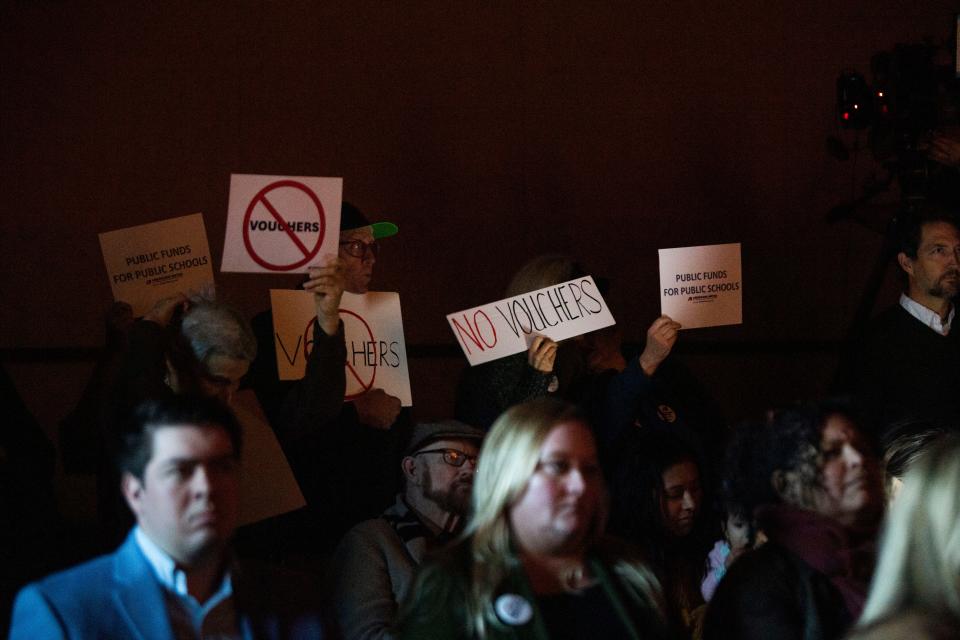Tennessee voucher expansion opposed by 55% of Republican primary voters, poll finds
About 55% of likely Republican primary voters oppose Gov. Bill Lee’s universal school choice proposal, according to a new statewide poll conducted by Co/efficient and the Tennessee Education Association.
Lee's proposal, dubbed the Education Freedom Scholarship Act, would give up to $7,075 each to 20,000 students to attend private or home schools, with a plan to expand universal eligibility in 2025.
Among poll respondents, 39% said they support or somewhat support Lee's proposal "even if it reduces money for public education," while 55% said they opposed or somewhat opposed the plan, and 5% were unsure.
Opposition in Tennessee's rural areas largely outpaced the state's five metro areas, with 58% of respondents opposed or somewhat opposed to statewide voucher expansion. Meanwhile, 55% opposed in Nashville, 59% opposed in Memphis, and 57% opposed in Chattanooga ― the three cities where the state's Education Savings Accounts program currently operates.
Costs for the proposal are "a serious concern" for 73% of voters, the poll found. It is not yet clear how much the proposed statewide voucher program would cost the state. Based on the number of students included in the first year, the program would cost the state $141.5 million if all slots are filled, plus administrative costs. The Fiscal Review Committee has not yet completed a fiscal analysis of the bill.

Lee has said previously the program would be paid for from a separate scholarship account funded by the state's General Fund, independent of the existing Tennessee Investment in Student Achievement funding structure for K-12 education.
The poll was conducted by national research and analytics company Co/efficient, in partnership with the Tennessee Education Association, the largest professional association of public school educators in the state. Pollsters reached 756 likely Republican primary voters between Jan. 4 and Jan. 8, 2024, and the poll has a margin of error of plus or minus 3.56 percentage points.
“More than 90% of Tennessee children attend public schools,” TEA President Tanya T. Coats said in a statement. “This polling confirms that Tennessee voters understand the threat private school vouchers pose to beloved neighborhood schools. Taking taxpayer dollars to fund private school tuition or homeschooling statewide would divert much-needed resources from our already underfunded public schools and threaten the strength of our Tennessee communities.”

According to the poll, 70% of likely Republican primary voters opposed consolidation or cuts to extracurricular activities at neighborhood public schools.
Two-thirds of Republican voters who reported participating in the last four primary elections said they would not support a candidate who had supported school vouchers, according to the poll.
“This polling indicates the people back home who elected our state legislators strongly oppose universal vouchers,” Coats said. “The General Assembly should listen to their constituents, fulfill their constitutional obligation to provide a system of public education for our children and do right by all Tennessee students by rejecting the governor’s proposal.”
But critics pointed to TEA's opposition to vouchers, accusing the teachers group of releasing a poll based upon misleading, biased questions that respondents could complete and submit multiple times.
"No matter where you stand on ESAs or educational choice, this poll is nothing more than a push poll from the TEA using a disreputable pollster (rated as a 1.1/3 according to 538)," said Beacon Center Vice President of Communications Mark Cunningham. "Not only was this poll accessible to any person with a link to take as many times as they saw fit, but the TEA intentionally omitted questions and demographic information to push an agenda. Transparency and fairness are the key to any reputable poll, and this poll lacked both."
Corey DeAngelis, a senior fellow at the American Federation for Children, denounced the poll questions posed by TEA as dishonest.
"The push poll primes respondents with about a dozen loaded questions each including the usual union buzzwords and arguments against school choice, and – of course – no question mentions the benefits of school choice," DeAngelis told The Tennessean in statement. "They might as well have asked respondents if they'd support school choice if it also meant it would make the sun stop shining. I've never seen a push poll as biased as this one and I'm surprised the union tried to present it as a legitimate result."
Earlier this month, a poll conducted by the conservative-leaning think tank The Beacon Center of Tennessee found that 68% of respondents support Lee’s plan to offer state-paid scholarships to private schools, while just 19% oppose expansion. The Beacon poll found 85% of Republicans support the move, while a majority of independents and Democrats also support taking the plan statewide.
TEA Statewide Voucher Poll Crosstabs by USA TODAY Network on Scribd
Vivian Jones covers state government and politics for The Tennessean. Reach her at vjones@tennessean.com.
This article originally appeared on Nashville Tennessean: TN voucher expansion opposed by 55% of Republican primary voters

